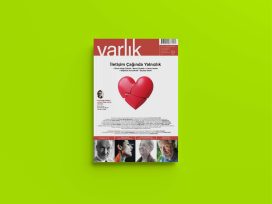Over the past ten years, four Slovenian feature films have been screened at the Venice Film Festival: Skafar’s Dad (Oca, 2010), Mderndorfer’s Suburbs (Predmestje, 2004) and Landscape No. 2 (Pokrajina st., 2008), and of course Cvitkovic’s Bread and Milk (Kruh in mleko, 2001),which was the only one of the four to win a prize, the Lion of the Future.
Three short films should also certainly not be overlooked: Cvitkovic’s The Heart is a Piece of Meat (Srce je kos mesa, 2004) and This is Earth, my Brother (To je zemlja, brat moj, 2009), and Sterk’s Every Breath you Take (Vdih, 2008), which we also had occasion to view at Mostra.
Although Slovenian cinema certainly has no reason for disappointment regarding its presence at the Venice Film Festival in the last decade, and among high caliber festivals this one represents Slovenia’s most successful stop, this year’s Mostra took place without a film contribution from the sunny side of the Alps. This once again raises the question of the true and above all optimal range of Slovenian film, which should certainly assert its place abroad in a regular and systematic way, as well as a second and somewhat broader question as to whether participation at these kinds of film festivals is even a primary goal. We could once again list all the aggravating circumstances which make it difficult for Slovenian film to make its way to these elite exhibitions of the seventh art, among which its quantitatively modest production is still the biggest obstacle.
However, the answer to the question of whether it is worth making an effort so that Slovenian film can penetrate these major festival events can only be a clear and distinct “Yes”. It is difficult to imagine more critical feedback as to whether a country’s cultural policy in some field of art is successful, and whether this art is in touch with contemporary trends, than that which can be provided by an international comparison of film products on this global market. It brings together not only the highest profile filmmakers from all over the world, but also representatives of accompanying fields: distributors, film critics, journalists, cinema programmers and representatives of a whole spectrum of various film institutions, from foundations to museums and cinema networks. The awarding of prizes there perhaps does indeed make it into a sort of competition from art, but anyone familiar with film will view this subjective and pomp-filled awarding of prizes with a certain detachment. The key to the success of a festival still remains in large degree in the quality of the programmatic policy, which the Venice festival certainly has, thanks to program director Marco Mller, and this is something that the most discerning visitors still value highly.
On some other occasion we will have more to say about Slovenian film, since there will be plenty of glimpses behind and in front of the scenes at the forthcoming Festival of Slovenian Film. But at the close of this year’s Mostra we need to take up a different topic. On the margins of the densely packed film program in Venice, where due to the concurrent running of quality events from morning till evening you have to miss films and accompanying events, one after another, that you would otherwise like to attend, there was a symposium intended as a press conference in the auditorium, entitled The Future of Film Festivals. Eminent names from film journalism such as Peter Cowie, Derek Malcolm, Michel Ciment and Richard Corliss took part. It is worth emphasizing in particular the fact that the debate moved in an entirely unexpected but still quite interesting direction.
The first third of the symposium, when speakers usually make their first introductory remarks, was indeed devoted to the question of what role film festivals play today. The participants agreed that such a major event as Venice cannot be defined as having one dominant function but rather combines many functions (premieres, distribution market, red carpet, meeting of critics etc.), which together form an inseparable whole, and this is what gives it global relevance.
Then gradually, imperceptibly – and it turned out, finally – the discussion turned to another field: film criticism. Film festivals, including those as eminent as Venice, are still highly dependent on the domestic and foreign journalists who cover them. At the end of the day it is this channel of communication through which news of the festival events reaches the world. And although we may consider these reports from the scene of the festival as it is taking place, and which we can follow in newspapers, television, and the internet, as something we can take for granted, they are not a given. First of all because there are other events competing for the same media space as the Venice Film Festival. In particular, the film festival in Toronto, which already begins before Mostra comes to an end, and for which a fair portion of celebrities who a week prior had been strolling the streets and canals of the Lido depart. Secondly because, and this is of considerably greater import – the quality of the reporting mentioned is declining severely. Michel Ciment, editor of the renowned film magazine Positif, during this year’s visit to Venice expressed amazement at the symposium about the difference that has emerged over the years between the daily reporting of French and Italian newspapers about the festival. While the French reporting still maintains its high quality, and besides reviews by independent critics of the most acclaimed films also devotes sufficient coverage to less well known film titles from the noncompetitive program, Italian media have been take over by uncritical writing about films which, already with respect to the choice of topics, borders on tabloid journalism.
This may have been the case this year even more than in previous years: Madonna’s film W. E., which shows another side of the story told by last year’s Oscar-winning The King’s Speech, premiered at the Venice Festival. This story about the brother of George VI, who liked parties and supposedly – in Madonna’s words – was more liberated from social norms, was characterized by English film critic Derek Malcolm as “a shitty film” at the symposium. But nevertheless this same title, due to the director’s celebrity status, like it or not filled the pages of domestic newspapers during the festival. Naturally not with articles about Madonna’s deficiencies as a director, but with photos of her grand arrival under tight security at the Palazzo del Cinema.
The vicious circle in which the media for their survival must seize on whatever they can to gain mass readership was on full display this year in Venice. An avalanche of commercialization and tabloidization is slowly but surely destroying everything in its path, all across Europe. From one place news arrives of subtle and insidious cases of censorship, from another of funding cuts, which forces the already underfunded print media online, and from yet another place we hear the voice of film critics who can no longer make a living by writing about film. Symposium participants would not have taken up this topic in such a broad and serious way if it did not in fact have a very close connection with the title, the future of film festivals themselves. From a distance these kinds of big film events, which we have never had in Slovenia and never will, may appear as powerful and unshakeable pillars with a strong tradition and far-reaching reputation throughout the world. But nevertheless this kind of world film giant is at its core a multifaceted and fragile organism which is dependent not only on capital and big names but which is also being shaped by visitors from the very bottom of the pyramid, from which its critical legitimacy also comes.
Due to the specific social circumstances in which we have found ourselves in recent years, it seems that the battle against the decline in media quality will be a long one, and long-term and optimistic solutions from the daily struggle with market forces are not yet in sight. That we are far from alone in this struggle is at the moment only weak consolation. George Clooney in The Ides of March, the opening film of this year’s Venice festival, destroyed his own democratic political idealism in a way that would not have been possible a few years ago given the euphoria accompanying the rise of the political left in the USA. Here also we could easily find a parallel with the political situation in our environment, with one difference. In our profession, on the other side of the economically and politically powerful, due to our numbers we at least have the good fortune that a piece of the same idealism is being shared among a huge, global mass of participants, which in the real world makes it virtually indestructible.






